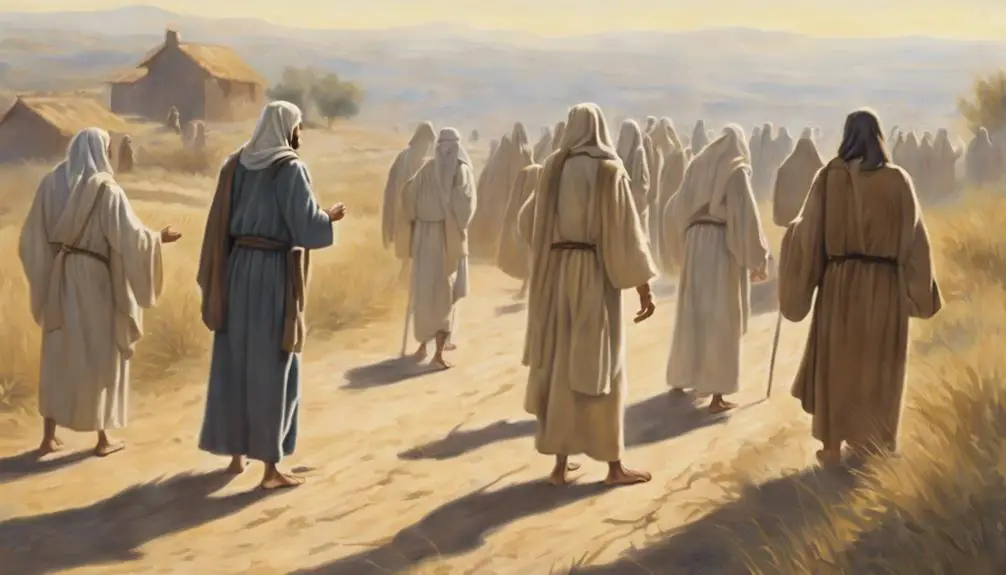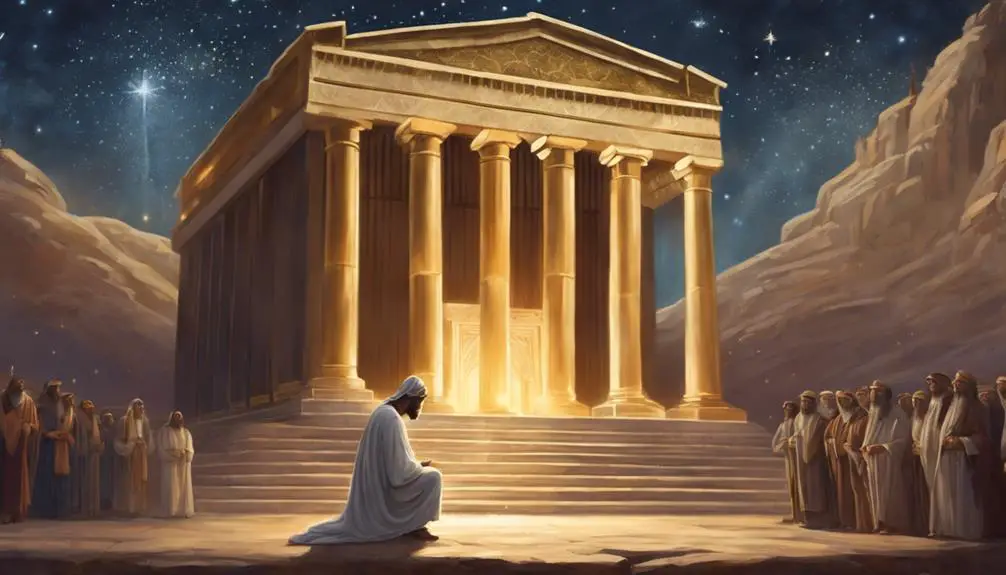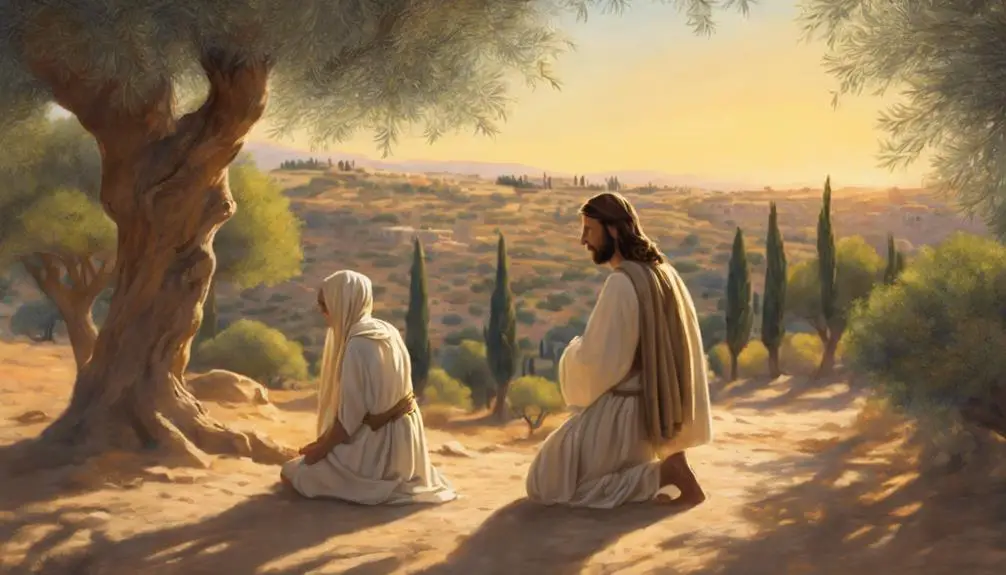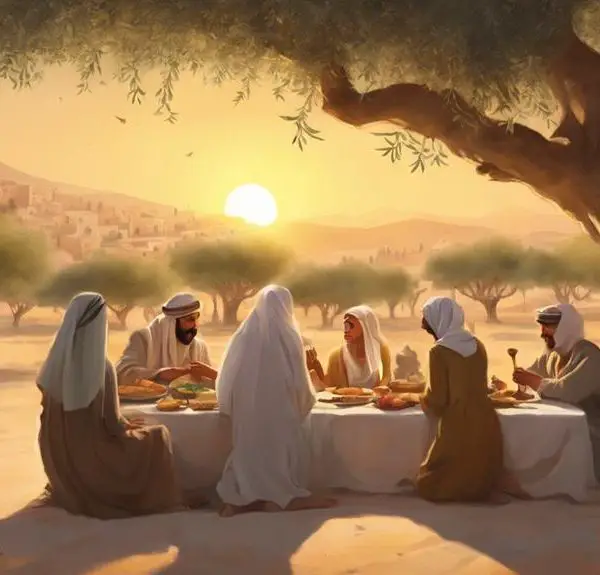An exploration of timeless biblical stories that reveal the profound impact of gratitude, inviting you to reflect on your own expressions of thankfulness.

Stories of Thankfulness in the Bible
In the grand tradition of expressing gratitude, the Bible hardly needs another thank you note, yet its pages are filled with poignant tales of thankfulness that might just make you rethink your own expressions of gratitude.
You've likely heard snippets of Hannah's earnest prayer or the singular thankful leper, but there's much more beneath the surface. From David's melodic thanks to Solomon's grand dedication, these stories aren't just ancient history—they're lessons wrapped in gratitude, waiting for you to uncover.
Let's explore these narratives together, and perhaps find new ways to weave thankfulness into the fabric of our lives.
Key Takeaways
- Biblical stories of thankfulness often highlight profound transformations, such as the healing of the Thankful Leper.
- Expressions of gratitude in the Bible include prayers, psalms, and acts of worship, demonstrating diverse ways to show thankfulness.
- Thankfulness is linked to recognizing divine intervention and blessings, as seen in Hannah's prayer and Solomon's dedication.
- Gratitude in the Bible serves as a response to God's faithfulness and a catalyst for personal and societal healing.
Hannah's Prayer of Gratitude

In the context of biblical narratives of gratitude, Hannah's prayer stands out as a poignant expression of heartfelt thankfulness to God, marking a significant moment of personal transformation and divine acknowledgment. This narrative encapsulates the essence of motherhood joy and the power of prayer within a spiritual framework that transcends mere personal gain, reflecting a deep-seated recognition of divine providence.
You'll find that Hannah's story isn't just about the fulfillment of a longing for motherhood but also about the profound impact of prayer power in effecting change in one's life and circumstances. Her prayer of gratitude, offered upon the birth of Samuel, illustrates a transformative journey from despair to joy, anchored in a steadfast faith in God's benevolence. This act of thanksgiving is both a personal declaration of God's goodness and a communal testament to the power of prayer.
Analyzing this narrative, it becomes evident that Hannah's prayer serves as a template for expressing gratitude in the face of received blessings, emphasizing the importance of acknowledging divine intervention in personal triumphs. Her story is a scholarly reminder of the intrinsic value of gratitude in forging a deeper connection with the divine, especially in the realm of motherhood joy.
The Thankful Leper

Moving from the intimate expressions of gratitude found in Hannah's prayer, we now explore another profound biblical narrative of thankfulness, that of the thankful leper, whose story offers a distinctive insight into the societal implications of gratitude and healing. This narrative isn't just about physical healing; it's also a profound lesson on miracle recognition and the overcoming of leprosy stigma.
In this account, ten lepers approach Jesus, seeking healing. They're healed, yet only one returns to express gratitude. This singular act of thankfulness isn't merely polite acknowledgment but a deep recognition of the miracle performed. The leper's return to Jesus, defying the societal stigma attached to his condition, underscores a profound understanding of both physical and spiritual restoration.
The narrative sharply contrasts the societal norms of the time, where leprosy not only meant physical ailment but also social ostracization. The thankful leper's actions break through these barriers, showcasing that gratitude can transcend societal prejudices and limitations.
This story, therefore, doesn't just highlight the importance of thankfulness in the face of divine intervention; it also challenges us to recognize miracles in our lives, irrespective of societal stigmas or barriers. It teaches that gratitude has the power to transform not just individuals but society at large.
David's Psalms of Thanksgiving

Delving into the Psalms, we find David's expressions of thanksgiving not only reflect his personal gratitude but also illustrate a broader theological perspective on God's providence and benevolence. David's Psalms serve as a testament to his profound relationship with God, marked by heartfelt thankfulness. These compositions, rich in emotional expression, reveal the intensity of David's faith and his recognition of God's steadfast love and mercy.
The Psalms are not just religious texts; they are also significant for their musical influences. David, often depicted with his harp, utilized music as a powerful medium to convey his gratitude and devotion. This amalgamation of music and poetry emphasizes the depth of David's emotional expression, making his Psalms timeless pieces of spiritual and artistic significance.
Aspect |
Significance |
|---|---|
Musical Influences |
Highlight the role of music in enhancing the emotional depth of thanksgiving. |
Emotional Expression |
Reflect the authentic, raw feelings of gratitude and dependence on God. |
Through this analytical lens, we observe that David's Psalms of Thanksgiving are not mere recitations of gratefulness. They embody a complex interplay of faith, art, and emotion, offering insights into the ways musicality and heartfelt expression can elevate spiritual thanksgiving to a form of divine worship.
Solomon's Dedication Prayer

Building on the foundation of David's Psalms, Solomon's Dedication Prayer offers a different lens through which to explore the theme of thankfulness within the biblical narrative. Solomon's prayer, occurring at the culmination of the temple construction, isn't just a monument to religious devotion but also a profound expression of gratitude. This prayer, steeped in humility and reverence, acknowledges the fulfillment of divine promises and the realization of David's vision through Solomon's hands.
What sets Solomon's prayer apart is its context and substance. The temple's completion was a monumental achievement, representing not just architectural grandeur but the embodiment of Israel's covenant relationship with God. Solomon's response to this achievement, however, centers not on personal accomplishment but on thankfulness to God for the wisdom and means to fulfill his task. His wisdom request, famously preceding this period, underscores this attitude—Solomon sought understanding to lead God's people effectively, not personal gain.
This narrative invites a scholarly reevaluation of thankfulness, positioning it as a response to divine faithfulness and guidance. Solomon's prayer encapsulates a moment of communal gratitude, reflecting on past promises, present fulfillment, and future hope, thus enriching the biblical discourse on thankfulness.
Jesus and the Grateful Woman

In the biblical narrative, the story of Jesus and the Grateful Woman provides a poignant exploration of thankfulness, showcasing a deeply personal act of gratitude towards Christ's compassion and forgiveness. This tale not only encapsulates the forgiveness theme but also challenges the societal norms of the time, offering rich layers for analysis.
Deeper Meanings for the Audience:
- Challenge to Societal Norms: The woman's act of washing Jesus' feet with her tears and anointing them with perfume was a bold defiance of societal boundaries. This indicates a profound level of thankfulness, one that surpasses fear of societal judgment.
- Forgiveness as a Catalyst for Thankfulness: The forgiveness theme is central, illustrating that true forgiveness can evoke an overwhelming response of gratitude. This woman's actions serve as a testament to the transformative power of receiving forgiveness.
- Personal Connection Overcomes Protocol: Unlike the Pharisee who hosted Jesus but neglected the customary acts of hospitality, the woman's actions emphasize the importance of personal connection and genuine thankfulness over rigid adherence to protocol.
This narrative invites you to reflect on the depth of your own gratitude, especially in the face of forgiveness, and challenges you to consider how societal norms might influence your expressions of thankfulness.
Frequently Asked Questions
How Do Different Cultures Outside of the Bible Express Gratitude and Thankfulness in Their Spiritual or Religious Practices?
You'll find that various cultures express gratitude through unique cultural festivals and gratitude rituals, distinct from biblical stories. These practices often reflect deep historical and spiritual meanings, serving as a bridge between the community and their beliefs.
From the communal feasting of Thanksgiving in the United States to the reflective nature of Japan's Shichi-Go-San, each tradition carries its own way of acknowledging blessings, fostering a sense of appreciation and connection within communities.
In What Ways Has Modern Psychology Linked Gratitude to Mental and Physical Health, and How Does This Compare to Biblical Stories of Thankfulness?
Modern psychology links gratitude to improved mental and physical health through practices like gratitude journaling and principles of positive psychology.
You'll find that regularly acknowledging what you're thankful for can boost your mood and immune system. This mirrors biblical stories where thankfulness leads to spiritual and physical well-being.
Although the contexts differ, both approaches highlight gratitude's power in enhancing life quality, showcasing a timeless truth across different spheres of thought.
Can the Concept of Thankfulness Be Found in Atheistic or Non-Religious Worldviews, and How Is It Expressed Without a Religious Context?
Absolutely, you'll find the concept of thankfulness in atheistic or non-religious worldviews, particularly within secular humanism. Here, gratitude is often expressed through personal reflection and gratitude rituals, such as journaling or mindful contemplation.
These practices allow individuals to acknowledge and appreciate the positive aspects of life without attributing them to a divine source. This secular approach underscores the universal nature of thankfulness as a beneficial aspect of human psychology and social interaction.
How Do Biblical Teachings on Thankfulness Influence Contemporary Christian Practices, Such as Prayer, Worship, and Community Service?
You might wonder how biblical teachings on thankfulness shape modern Christian life.
It's clear that these teachings deeply influence prayer, worship, and community service. Gratitude rituals become a cornerstone, embedding thankfulness in daily acts and gatherings.
Thankfulness testimonies, shared among believers, not only strengthen faith but also foster a supportive community.
Analyzing this, it's evident that the biblical emphasis on gratitude continues to inspire contemporary practices, making thankfulness a pervasive and uniting force.
What Are the Historical Origins of Thanksgiving Celebrations in Various Religions, and How Do They Compare to the Biblical Accounts of Thankfulness?
You're exploring the historical origins of Thanksgiving celebrations across various religions, comparing them to each other, but not to biblical thankfulness.
Harvest festivals, pivotal in many traditions, share common ground with Pilgrim history in the U.S., marking gratitude for bountiful harvests.
Analyzing these across cultures, you'll find similarities and differences in expression and significance, shedding light on how these traditions have evolved and influenced contemporary observances of thanksgiving and gratitude.
Conclusion
In analyzing these biblical narratives, it's clear that expressions of thankfulness aren't merely acts of politeness but are deeply woven into the fabric of spiritual life.
These stories underscore a fundamental principle: gratitude transcends mere acknowledgment of blessings; it's a profound recognition of divine providence and interconnectedness.
Through characters like Hannah, the leper, David, Solomon, and the grateful woman, the Bible elucidates that thankfulness is an essential element in fostering a meaningful, reflective, and communal relationship with the divine.



Sign up